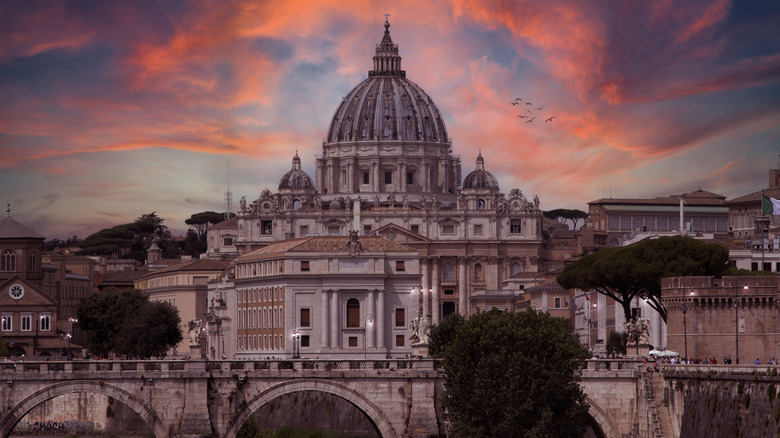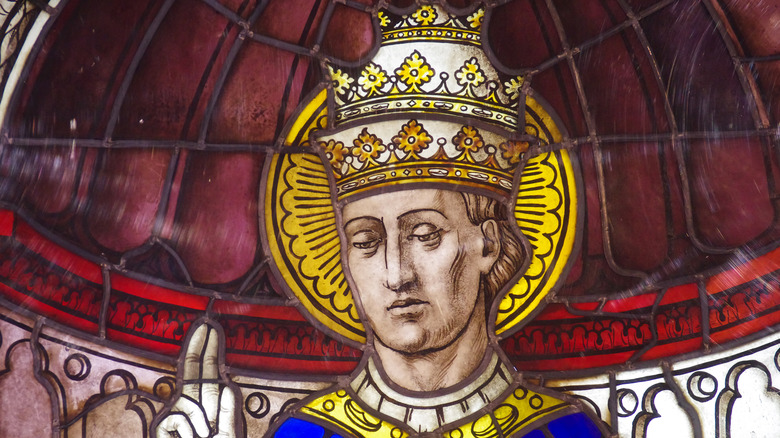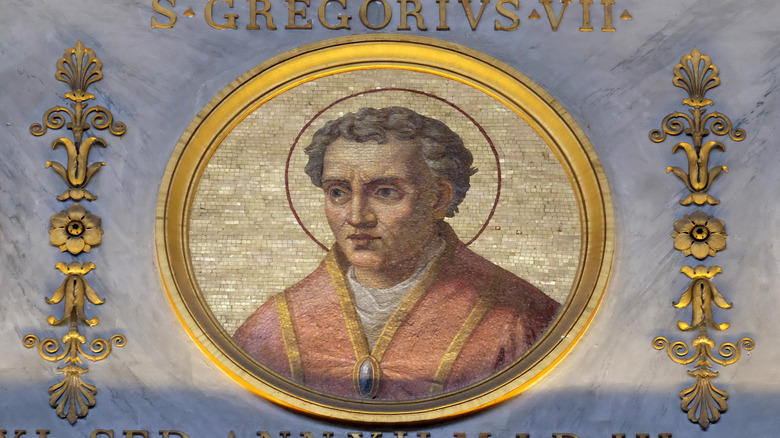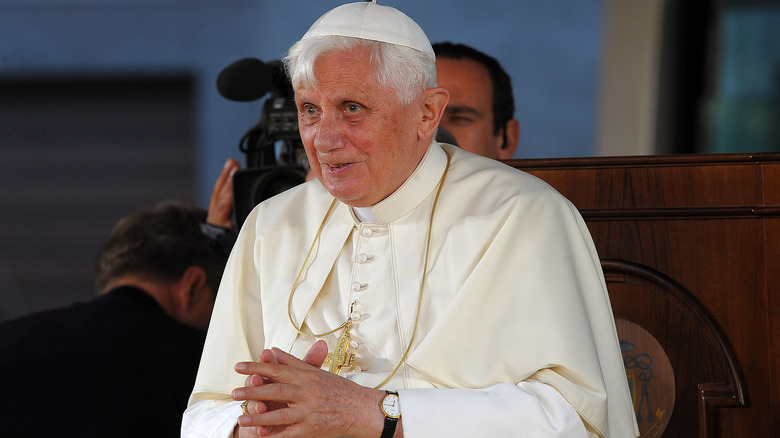So Far, Only 5 Popes Have Resigned In The Last 1000 Years
When Pope Benedict XVI resigned in 2013, he shocked the world, given that he was the first pope to do this in roughly 600 years. Throughout the entire history of the Catholic Church, there have only been a few popes who have resigned, and most of them did so in the last 1,000 years. Most popes choose not to resign and occupy the papacy until their death.
According to Debbi Wilgoren in The Washington Post, "Most modern popes have felt that resignation is unacceptable except in cases of an incurable or debilitating disease — that paternity, in the words of (Pope) Paul IV, cannot be resigned." Nonetheless, this has not always stopped popes from resigning anyway, and for a multitude of different reasons. Some resigned for personal desire, some for political reasons, and even some out of humility. So who were the popes who have resigned in the last 1,000 years?
Pope Benedict IV
Pope Benedict IX, the first pope to have resigned in the last 1,000 years, was also the youngest man to ever hold the office of the papacy, according to Insider. Being somewhere between the age of 11-20 (most likely 12, according to Insider), Theophylactus of Tusculum became the youngest pope due to his family's influential power over the Catholic Church.
Popes John XIX and Benedict VIII were Pope Benedict IX's uncles, and the young Benedict IX was a member of one of the most powerful families in Italy at the time, the Colonnas, according to Insider. Some members of the Catholic Church at the time were not exactly fond of Pope Benedict IX, and in 1036, officials in the Church attempted to assassinate the new pope. Eventually, the German emperor Conrad II restored power to Pope Benedict IX. However, he faced another insurrection attempt in 1045, where he was forced out of Rome, and Bishop John of Sabina became Pope Sylvester III (via Britannica). Pope Benedict IX quickly regained power, but resigned shortly after taking a bribe from his godfather, given his ambitions to marry, according to The Washington Post.
Pope Gregory VI
After Archbishop John Gratian bribed his godson Pope Benedict IX to abdicate the papacy, the archbishop himself was elected to be the next pope, taking the name Gregory VI in 1045, according to Insider. However, after the former Pope Benedict IX failed to marry the woman he was pursuing, he wished to return to the papacy (via The Washington Post). Former Pope Benedict IX traveled to the Vatican, occupied the city simultaneously with Pope Gregory VI, and claimed to be the legitimate pope.
At the same time, the former Pope Sylvester III also came to the Vatican to claim a right to the papacy (via Britannica). Eventually, the clergy urged Emperor Henry III of the Holy Roman Empire to help resolve the conflict, and so Henry III had Pope Gregory VI stand trial in front of the Council of Sutri, according to Britannica. During the trial, Pope Gregory VI was forced to resign because he had bought the papacy. After this, Suidger of Bamberg became Pope Clement II (via Britannica). He only ruled for about a year; he died in 1047.
Pope Celestine V
Not all popes have resigned in such a chaotic manner, however, and a prime example of that is Pope Celestine V. Born as Pietro Da Morrone, Pietro lived a life as a hermit in the Abruzzi Mountains, according to Britannica. He lived a peaceful life and also attracted followers due to his ascetic nature. However, in the year 1294, Pietro was elected pope. The newly-elected pope resented his position, but he accepted due to the Catholic Church's political struggles (via Britannica).
The Church had not had a pope for two years, so Pietro felt it was necessary to accept the position to bring stability to the Church. However, due to his old age, and lack of desire for the papacy, Pope Celestine V resigned. His reasons for resignation were "the desire for humility, for a purer life, for a stainless conscience, the deficiencies of his own physical strength, his ignorance, the perverseness of the people, his longing for the tranquility of his former life" (via The Washington Post). Pope Celestine V's successor, Pope Boniface VIII, had Celestine locked up, believing the resignation to be unlawful. Celestine died while he was imprisoned. He was declared a saint 17 years later, in 1313.
Pope Gregory XII
The next pope to resign from the papacy was Pope Gregory XII, who was actually one of two men who claimed to be pope, ruling at the same time. Pope Gregory XII became pope during the Western Schism, also known as the Great Schism, which forever changed the way the Catholic Church functioned. The Great Schism occurred after Pope Clement V moved to Avignon, France. For 70 years, the pope resided in France, but due to pressure from local Romans, there was a papal election in Rome which elected Pope Urban VI, according to Britannica.
After Pope Urban VI proved hostile to the cardinals, some cardinals moved back to Avignon and elected their own pope, Pope Clement VII (via Britannica). After years of division within the church, a council was organized to elect a new pope, Alexander V, but was he then shortly succeeded by a new pope, Pope John XXIII (via Britannica). Now three popes claimed the papacy, but a new council was called, the Council of Constance, which would finally resolve the Great Schism. The Roman pope, Pope Gregory XII, resigned as a way to bring stability to the Church. Meanwhile, the Council of Constance deposed the other popes and in 1417 elected one new pope, Pope Martin V, who was then considered the true pope (via Britannica).
Pope Benedict XVI
At this writing, the most recent pope to have resigned was Pope Benedict XVI. Resigning in 2013, Pope Benedict XVI cited old age and mental exhaustion as his reasons for resignation, according to the BBC. However, it is suspected that there might have been more to the case. According to a new report, during the five years he served as archbishop of Munich, Pope Benedict XVI allegedly knew about priests who were sexually abusing boys, yet continued to allow them to work in parishes, according to a German law firm hired by the Catholic Church in Germany to investigate how the Church dealt with abuse cases, says the BBC.
The Vatican responded to these claims saying that they would examine the details of the report, stating, "As we reiterate the sense of shame and regret for the abuses on minors by priests, the Holy See expresses its support for all victims and it confirms the path to protect minors, guaranteed safe spaces for them" (via BBC).
If you or someone you know is dealing with spiritual abuse, you can call the National Domestic Violence Hotline at 1−800−799−7233. You can also find more information, resources, and support at their website.
If you or anyone you know has been a victim of sexual assault, help is available. Visit the Rape, Abuse & Incest National Network website or contact RAINN's National Helpline at 1-800-656-HOPE (4673).





